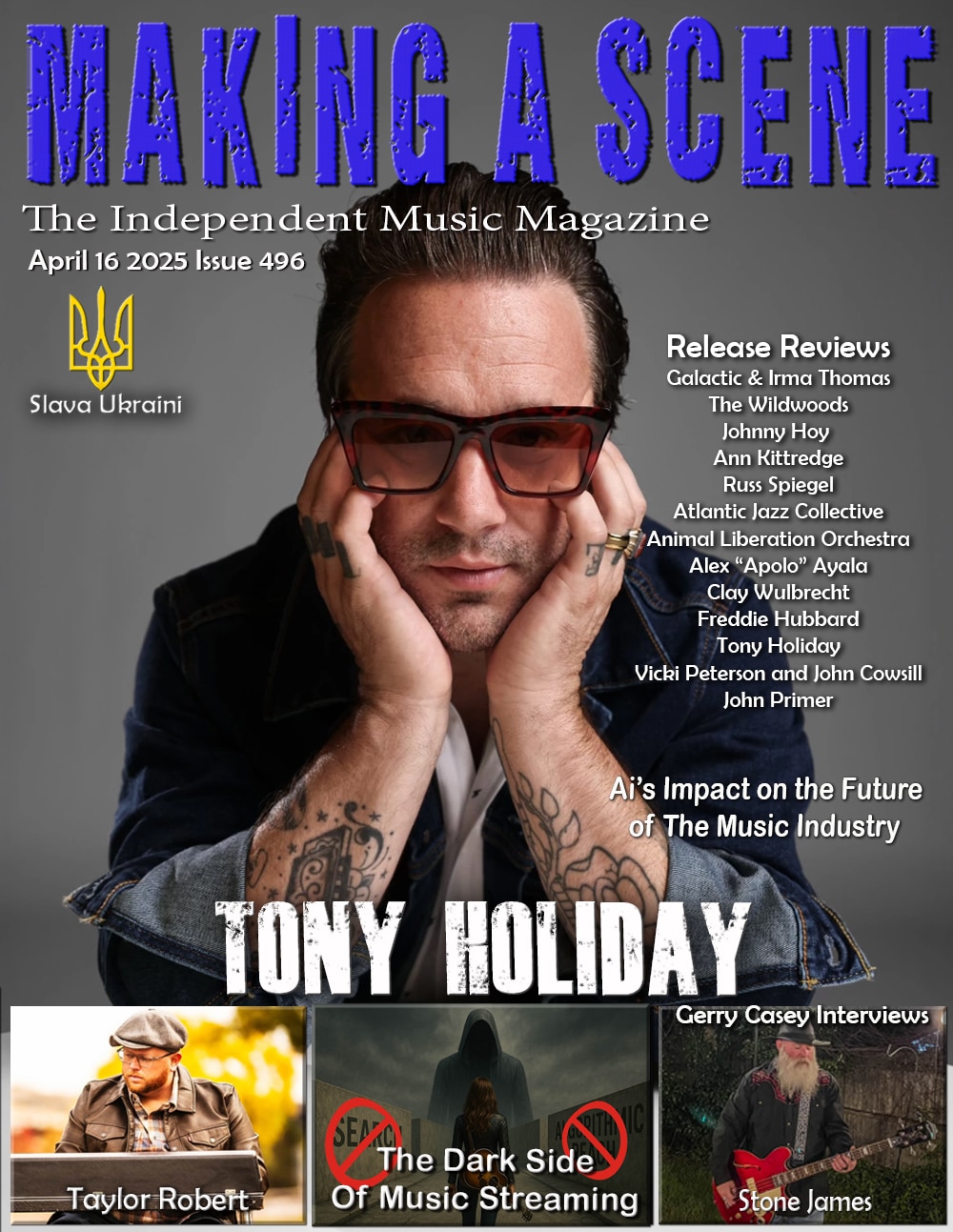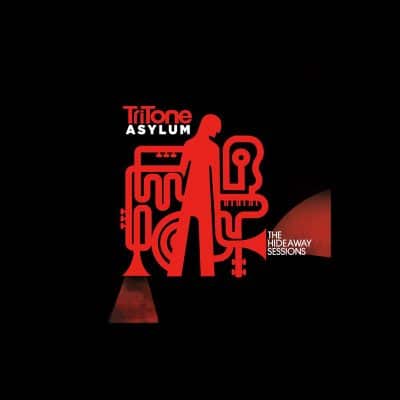Tritone Asylum The Hideaway Sessions
The Hideaway Sessions
Blue Canoe
Tritone Asylum is a collective that brands their music “electro-acoustic,” filled with jazz-fusion, jazz improvisation, and Latin rhythms. It’s a tantalizing concoction that nods to familiar fusion pioneers of the ‘70s, Pat Metheny, the breakthrough sound of ECM, and versatile players such as Eddie Harris and The Brecker Brothers, without mimicking any of it. They take the best of each to create their own sound which is not in the totally free-form improvisational mode such as Bright Dog Red or avant-garde units but leans more to composition with plenty of room to stretch out. Originally EVI player Philip Topping, guitarist Andy Waddell, keyboardist Aubrey Scarbrough, and bassist Peter Sepsis, are the band’s founders. When Scarborough moved away, the others decided to go forward as a core trio and have since added six-eight players to the collective. The Hideaway Sessions is a mix of originals penned by group founders Topping and Sepsis. Sepsis says, “I try to make music that reflects the sounds of the street. That’s way we move between an Afro groove, then funk, then Latin. The sounds of the street are made by people in the diverse community that is Los Angles, If I’m not moving people, I’m not doing my job.”
The original bond between Topping and Sepsis were their shared taste in the music of Herbie Hancock, the Brecker Brothers, Eddie Harris, and especially Pat Metheny. Topping stopped playing trumpet in 1998 and took up the EVI, which he was playing when he met Sepsis. Intrigued by Metheny’s guitar synth sounds, Topping began to deeply explore the sonic possibilities of using the EVI as the lead instrument, although he also plays trumpet and flugelhorn on this recording. Drummer Dave Johnstone became one of the first members of the expanded band. Saxophonist Ian Vo replaced original sax player Allen Mascari (appearing on 2 tracks) who had moved away. The other members that float in and out, all who appear hers are pianist/keyboardists Mitch Forman (now a permanent member) and Henri Wilkinson, Gary Herbig (flute and soprano sax), and percussionists Billy Hulting and Baba Sissoko, each of whom graces one track.
Opening with Septis’ “Grasshopper,” we hear Hulting adding to the tunes Latin/Calypso feel. Topping has a different approach to writing, first singing or humming a melody on the piano or EVi before composing the entire piece. “Schizophrenic” has two different melodies, first a simple one and later a more angular spacey one in which you’ll hear echoes of Hancock’s Headhunters and/or The Brecker Brothers. Sepsis’ “54 Blues,” as you may have guessed is in 5/4 time but is also in the key of A, not a typical key for blues. It features Forman on organ. Already in these first three pieces, we’ve experienced an eclectic sonic mix.
“The Road to Hue,” from Septis, is a haunting piece about a trip to Vietnam, where in Hue he saw vestiges of the war in bunkers, bomb crater, and even agent orange, thus an ethereal ECM kind of sound, simultaneously somber and gorgeous. Sepsis also composed “Malawi,” with the melody echoing a birdsong he heard on the shores of Lake Malawi in Mali. The song opens appropriately with the Mali-born, Europe-based vocalist and percussionist Sissoko, who chants “Malawi” and adds the African percussion to this tune that inevitably evokes Weather Report and has an effervescent piano solo from Forman. In another global inspired tune, Topping authors “Ballad for Nongra” for his longtime Thai companion. Mascari adds his tenor to “The Road to Hue” and on the latter piece we hear Wilkinson on piano and keyboards as well as Herbig on soprano and flute. The meshing of Topping’s EVI and flugelhorn, Herbig’s soprano, Waddell’s guitar and Wilkinson’s synths paint stunning, floating multi-tonal harmonic tapestries, on Topping’s ballad.
Topping’s epic 12-minute live “Simple” begins with a plain melody on the EVI before morphing into a boisterous fusion workout with strains of later period Eddie Harris and these ears, Weather Report as well, with Sepsis’ bass lines evoking Jaco Pastorius. The core band of Topping, Vo, Waddell, Forman, Sepsis, and Johnstone play here as they do on all previous tracks but the two cited above. Vo goes beast mode on tenor pushed by Johnstone’s busy trap work. Forman steps in soloing on Rhodes, eventually using wah-wah effects as Waddell and Topping join in to create a fusion maelstrom, somehow finding their way to solid ground restating the theme in three different modes as they go out. We hear applause which attests to this one’s high energy level in comparison to the other more brooding fare.
Metheny’s influence comes most directly in Topping’s closing “First Days of Summer,” the other piece which has Mascari on tenor along with the other core sextet members. Topping captures the elation one feels after being released from school, or even closer for most of us, our pandemic stay-at-home state, with the breezy effects rendered by his EVI, Waddell’s flowing guitar lines, and Forman’s colorful touches.
Tritone Asylum delivers highly accessible music, stocked with lyrical intrigue and many great moments in this eclectic offering that leans toward a softer, easier-on-the-ears kind of fusion than much of then controversial jazz-rock fusion that marked the ‘70s and ‘80s.
- Jim Hynes
Buy Us a Cup of Coffee!
Join the movement in supporting Making a Scene, the premier independent resource for both emerging musicians and the dedicated fans who champion them.
We showcase this vibrant community that celebrates the raw talent and creative spirit driving the music industry forward. From insightful articles and in-depth interviews to exclusive content and insider tips, Making a Scene empowers artists to thrive and fans to discover their next favorite sound.
Together, let’s amplify the voices of independent musicians and forge unforgettable connections through the power of music
Make a one-time donation
Make a monthly donation
Make a yearly donation
Buy us a cup of Coffee!
Or enter a custom amount
Your contribution is appreciated.
Your contribution is appreciated.
Your contribution is appreciated.
DonateDonate monthlyDonate yearlyYou can donate directly through Paypal!
Subscribe to Our Newsletter
Discover more from Making A Scene!
Subscribe to get the latest posts sent to your email.
















































